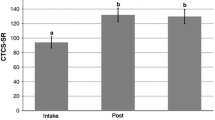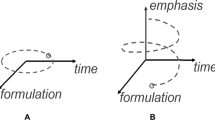Abstract
In the current study, the development and initial validation of the Suitability for Short-Term Cognitive Therapy (SSCT) interview procedure is reported. The SSCT is an interview and rating procedure designed to evaluate the potential appropriateness of patients for short-term cognitive therapy with an interpersonal focus. It consists of a 1-hour, semistructured interview, focused on eliciting information from the patient relevant to nine selection criteria. The procedures involved in the development of this scale are described in detail, and preliminary evidence suggesting that the selection criteria can be rated reliably is presented. In addition, data indicating that scores on the SSCT scale predict the outcome of short-term cognitive therapy on multiple dependent measures, including both therapist and patient perspectives, are reported. It is concluded that the SSCT is a potentially useful scale for identifying patients who may be suitable, or unsuitable, for the type of short-term cognitive therapy administered in the present study.
Similar content being viewed by others
References
American Psychiatric Association (1987).Diagnostic and statistical manual of mental disorders (3rd ed., rev.). Washington, DC: Author.
Arnkoff, D. B. (1983). Common and specific factors in cognitive therapy. In M. J. Lambert (Ed.),Psychotherapy and patient relationships. (pp. 85–125). Homewood, IL: Dorsey.
Battle, C. C., Imber, S. D., Hoehn-Saric, R., Stone, A. F., Nash, E. H., & Frank, J. D. (1966). Target complaints as a criteria of improvement.American Journal of Psychotherapy, 20 184–192.
Beck, A. T., Freeman, A., & Associates (1990).Cognitive therapy of personality disorders. New York: Guilford Press.
Beck, A. T., Rush, A. J., Shaw, B. F., & Emery, G. (1979).Cognitive therapy of depression: A treatment manual. New York: Guilford Press.
Beck, A. T., Ward, C. H., Mendelson, M., Mock, J., & Erbaugh, J. (1961). An inventory for measuring depression.Archives of General Psychiatry, 4 561–571.
Bordin, E. S. (1979). The generalizability of the concept of working alliance.Psychotherapy: Theory, Research, and Practice, 16 252–260.
Davanloo, H. (1980). A method of short-term dynamic psychotherapy. In H. Davanloo (Ed.),Short-term dynamic psychotherapy (pp. 43–71). New York: Jason Aronson.
Derogatis, L. R. (1977).SCL-90 administration, scoring and procedures manual—I. Baltimore: Johns Hopkins.
Elkin, I., Shea, M. T., Watkins, J. T., Imber, S. D., Sotsky, S. M., Collins, J. F., Glass, D. R., Pilkonis, P. A., Leber, W. R., Docherty, J. P., Fiester, S. J., & Parloff, M. B. (1989). National Institute of Mental Health Treatment of Depression Collaborative Research Program: General effectiveness of treatments.Archives of General Psychiatry, 46 971–982.
Fennell, M. J. V., & Teasdale, J. D. (1987). Cognitive therapy for depression: Individual differences and the process of change.Cognitive Therapy and Research, 11 253–272.
Foa, E. B., & Rozak, M. (1986). Emotional processing of fear: Exposure to corrective information.Psychological Bulletin, 99 20–35.
Goldfried, M. R. (1982). Resistance and clinical behavior therapy. In P. L. Wachtel (Ed.),Resistance: Psychodynamic and behavioral approaches (pp. 95–114). New York: Plenum Press.
Guidano, V. F. (1987).Complexity of the self: A developmental approach to psychopathology and therapy. New York: Guilford Press.
Guidano, V. F., & Liotti, G. (1983).Cognitive processes and emotional disorders. New York: Guilford Press.
Hollon, S. D., & Kendall, P. C. (1980). Cognitive self-statements in depression: Development of an automatic thoughts questionnaire.Cognitive Therapy and Research, 4 383–395.
Horvath, A., & Greenberg, L. S. (1986). The development of the Working Alliance Inventory. In L. S. Greenberg & W. Pinsof (Eds.),The psychotherapeutic process: A research handbook (pp. 529–556). New York: Guilford Press.
Jacobson, N. S. (1989). The therapist-client relationship in cognitive behavior therapy: Implications for treating depression.Journal of Cognitive Psychotherapy, 3 85–96.
Liotti, G. (1987). The resistance to change of cognitive structures: A counter-proposal to psychoanalytic metapsychology.Journal of Cognitive Psychotherapy, 2 87–104.
Mahoney, M. J. (1991).Human change processes. New York: Basic Books.
Malan, D. H. (1976).The frontiers of brief psychotherapy. New York: Plenum Press.
Mann, J. (1973).Time-limited psychotherapy. Cambridge, MA: Harvard University Press.
Marmar, C. R., Horowitz, M. J., Weiss, D. S., & Marziali, E. (1986). The development of the Therapeutic Alliance Rating System. In L. S. Greenberg & W. M. Pinsof (Eds.),The psychotherapy process: A research handbook (pp. 367–390). New York: Guilford Press.
Millon, T. (1982).Millon Clinical Multiaxial Inventory manual (3rd ed.). Minneapolis: National Computer Systems.
Persons, J. B., Burns, D. D., & Perloff, J. M. (1988). Predictors of dropout and outcome in cognitive therapy for depression in a private practice setting.Cognitive Therapy and Research, 12 557–576.
Rachman, S. (1980). Emotional processing.Behaviour Research and Therapy, 18 51–60.
Safran, J. D. (1990a). Towards a refinement of cognitive therapy in light of interpersonal theory: I. Theory.Clinical Psychology Review, 10 87–105.
Safran, J. D. (1990b). Towards a refinement of cognitive therapy in light of interpersonal theory: II. Practice.Clinical Psychology Review, 10 107–121.
Safran, J. D., & Greenberg, L. S. (1986). Hot cognition and psychotherapy process: An information processing/ecological perspective. In P. C. Kendall (Ed.),Advances in cognitive-behavioral research and therapy (pp. 143–177). New York: Academic Press.
Safran, J. D., & Segal, Z. V. (1990).Interpersonal process in cognitive therapy. New York: Basic Books.
Safran, J. D., Segal, Z. V., Shaw, B. F., & Vallis, T. M. (1990). Patient selection for short-term cognitive therapy. In J. D. Safran & Z. V. Segal (Eds.),Interpersonal process in cognitive therapy (pp. 229–237). New York: Basic Books.
Saunders, S. M., Howard, R. I., & Orlinsky, D. E. (1989). The Therapeutic Bond Scales: Psychometric characteristics and relationship to treatment effectiveness.Psychological Assessment, 1 323–330.
Sifneos, P. E. (1972).Short-term psychotherapy and emotional crisis. Cambridge, MA: Harvard University Press.
Strupp, H. H., & Binder, J. L. (1984).Psychotherapy in a new key: A guide to time-limited dynamic therapy. New York: Basic Books.
Sullivan, H. S. (1953). The interpersonal theory of psychiatry. New York: W. W. Norton.
Weissman, A., & Beck, A. T. (1978).Development and validation of the Dysfunctional Attitude Scale: A preliminary investigation. Paper presented at the meeting of the American Educational Research Association, Toronto.
Young, J. E. (1990).Cognitive therapy for personality disorders: A schema-focused approach. Sarasota, FL: Resources Exchange Inc.
Author information
Authors and Affiliations
Rights and permissions
About this article
Cite this article
Safran, J.D., Segal, Z.V., Vallis, T.M. et al. Assessing patient suitability for short-term cognitive therapy with an interpersonal focus. Cogn Ther Res 17, 23–38 (1993). https://doi.org/10.1007/BF01172738
Issue Date:
DOI: https://doi.org/10.1007/BF01172738




